|
|
|
Sort Order |
|
|
|
Items / Page
|
|
|
|
|
|
|
| Srl | Item |
| 1 |
ID:
116683
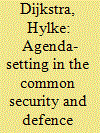

|
|
|
|
|
| Publication |
2012.
|
| Summary/Abstract |
The European Union (EU) has launched an impressive number of crisis management missions since its Common Security and Defence Policy became operational in 2003. This article analyses the agenda-setting phase of these civilian and military operations in order to explain why the EU has sent troops, policemen, judges, prosecutors and monitors across three continents. It presents an institutionalist perspective and argues that the former High Representative Javier Solana and his officials have been instrumental in putting various operations on the agenda. They have employed deliberate agenda-setting strategies, such as venue shopping, conflict expansion and issue framing, to further their bureaucratic interest of launching new missions. Solana and his officials had the ability to affect the agenda-setting process thanks to their pivotal position in policy making. This gave them with superior information on the state of play and an early mover advantage as well as strong international networks. The article provides empirical evidence from the crisis management missions in Aceh, Bosnia, Chad and Kosovo. It concludes with the changes to the Common Security and Defence Policy after the Treaty of Lisbon.
|
|
|
|
|
|
|
|
|
|
|
|
|
|
|
|
| 2 |
ID:
162547
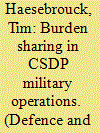

|
|
|
|
|
| Summary/Abstract |
Military burden sharing has been a subject of repeated debates in NATO and the UN. Despite more modest goals, the European Union’s (EU) Common Security and Defense Policy (CSDP) has experienced no fewer difficulties in garnering men, money, and materiel. While this may not come as a surprise, the fact that some EU member states have carried disproportionate shares of the burden of CSDP operations is a puzzle that remains unaccounted for. We address this gap by analyzing determinants of contribution levels to CSDP operations. In employing an innovative multi-method design that combines insights from collection action theory with those from integrated theories of military burden sharing, our results indicate that EU countries tend to contribute in positive disproportion with their capabilities when they have a strong peacekeeping tradition and elections are distant. In contrast, they undercontribute when small trade volumes with the area of operations combine with a weak peacekeeping tradition.
|
|
|
|
|
|
|
|
|
|
|
|
|
|
|
|
| 3 |
ID:
134066
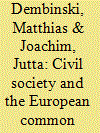

|
|
|
|
|
| Publication |
2014.
|
| Summary/Abstract |
The involvement of civil society organizations (CSOs) is widely regarded by students of the EU's domestic policy fields as enhancing transparency and accountability and, more generally, the democratic quality of political processes. This article explores the contribution of CSOs to the EU's Common Security and Defence Policy and assesses whether a democracy-enhancing effect of their involvement can also be demonstrated for this policy field. We analyse the contribution of CSOs based on two common models of democracy: the intergovernmental and the supranational model of democracy. We find that CSOs are indeed quite actively involved in the EU's security policy. With regard to their democracy-enhancing effects, however, our findings are rather mixed. While the engagement of CSOs does provide a remedy for the democratic deficits associated with intergovernmental decision-making, these organizations do not fully meet the demands posed by supranational governance.
|
|
|
|
|
|
|
|
|
|
|
|
|
|
|
|
| 4 |
ID:
190067
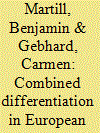

|
|
|
|
|
| Summary/Abstract |
Sustaining meaningful defense cooperation in Europe is made difficult by defense-industrial fragmentation, a multiplicity of institutional frameworks, divergent strategic cultures and domestic opposition to integration. The European Union’s recent foray into defense integration incorporates multiple forms of differentiation to overcome these barriers, with Permanent Structured Cooperation (PESCO) characterized by selective membership, external participation, and project-based clustering. Such “combined differentiation” offers an instructive example of how EU practices and principles can contribute to meaningful defense collaboration, even though Brussels is often thought a weak actor externally. It also illustrates how distinct forms of differentiation can be embodied within a single structure to accommodate complexity in strategic preferences. Using the example of PESCO, this article shows how “combined differentiation” has emerged as a response to the nature of the European defense landscape and how debates between member states about how to respond to specific challenges have brought about further differentiation over time.
|
|
|
|
|
|
|
|
|
|
|
|
|
|
|
|
| 5 |
ID:
118002
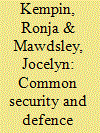

|
|
|
|
|
| Publication |
2013.
|
| Summary/Abstract |
This article argues that rather than being an emancipatory step for the EU, the Common Security and Defence Policy in its current format represents a continuation of US strategic hegemony. Using a neo-Gramscian model of hegemony, by considering both civilian and military aspects of CSDP, the article shows how US ability to export its strategic doctrine to EU member states is undiminished. It argues that respect for US military achievements is a key reason for this, but that this may lead EU states to make poor strategic decisions, which moreover may lack political and public legitimacy.
|
|
|
|
|
|
|
|
|
|
|
|
|
|
|
|
| 6 |
ID:
118001
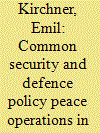

|
|
|
|
|
| Publication |
2013.
|
| Summary/Abstract |
Common Security and Defence Policy (CSDP) missions have increased substantially in number, functions and geographic spread since their inception in 2003. Despite their expansion in numbers and scope, especially in the Western Balkans, few systematic assessments of the contributions that CSDP missions make to peacekeeping and peacebuilding efforts have been undertaken to date. This article addresses that lacuna by assessing the contributions CSDP missions have made in recent years to peacekeeping and peacebuilding in the Western Balkans. It explores whether CSDP missions in that region: make an intrinsic contribution to peacekeeping and peacebuilding in those countries or merely profit (or take credit) from the initial groundwork laid by United Nations (UN) and North Atlantic Treaty Organization (NATO) missions; are adequately coordinated within the European Union (EU) and between the EU and other international organisations, including NATO; are sufficiently embedded or effectively linked to other EU instruments, such as the Stability and Association Process to the Western Balkans; and engender adequate elite or public support or 'ownership' in these countries.
|
|
|
|
|
|
|
|
|
|
|
|
|
|
|
|
| 7 |
ID:
184113


|
|
|
|
|
| Summary/Abstract |
The article explores the evolving positions and negotiation strategies of the EU and its member states regarding lethal autonomous weapon systems (LAWS). Specifically, it traces the proceedings around the UN disarmament forum Convention on Certain Conventional Weapons (CCW) from 2013 to 2020. Embedded in the norm contestation literature, the empirical section draws upon semi-structured interviews as well as document analysis. We find that, despite the absence of a CFSP position on the matter, the EU and key member states have been instrumental in shaping the discussions. However, the role of the EU is constrained due to double contestation. First, at the level of member states contestation persists on what is the appropriate regulatory framework (hard or soft law). Second, contestation is also exerted towards the EU by some member states who contest the EEAS’s involvement. Some are conscious that presenting an “EU position” might constrain their ability to build global coalitions. Others do not want the EU to interfere with their national sovereignty on such a critical security issue. While these two elements work against a common EU position, we also observe a window of opportunity for the EU. Notably, the EU can strengthen the CCW by funding the forum structures and secretariat, which could become an important body in the implementation of foreseeable agreements.
|
|
|
|
|
|
|
|
|
|
|
|
|
|
|
|
| 8 |
ID:
114943
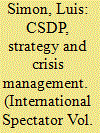

|
|
|
|
|
| Publication |
2012.
|
| Summary/Abstract |
The EU's ineffectiveness vis-à-vis Libya and the southern Mediterranean crises more broadly is largely explained by the CSDP's narrow mandate centred on crisis management. The EU's emphasis on external crisis management was strategically sound given the geopolitical context of the 1990s. CSDP's quiet drift towards a 'softer' kind of crisis management from the middle of the first decade of the 2000s was also instrumental in highlighting the EU's differences from post-11 September US unilateralism. That said, (soft) crisis management has become progressively obsolete in the light of a rapidly changing geopolitical environment characterised by an overall retreat of Western power globally, a weakening of America's commitment to European security, an increasingly tumultuous European neighbourhood, and Europe's financial troubles. In order to meet the demands of a changing geopolitical environment, CSDP must break away from its distinctively reactive approach to security to include all the functions normally associated with the military including, chiefly, deterrence and prevention. This would allow the EU to actively shape its regional and global milieu.
|
|
|
|
|
|
|
|
|
|
|
|
|
|
|
|
| 9 |
ID:
108582
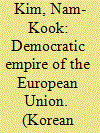

|
|
|
|
|
| Publication |
2011.
|
| Summary/Abstract |
This paper examines the EU's conflicting roles as a global actor between a normative
leader and a realistic compromiser. Since the Kosovo and Iraq wars, the EU has
experienced rapid progress in two policy areas: asylum and refugees; security and
defense. Although the two policy areas belong to different pillars, they were both
accelerated through the wars where Europe painfully recognized its incompetence.
This paper argues that increasing prioritization of security issues eventually
undermines the foundations of the EU's established commitment as a normative
leader in the area of human rights policies. Fortress Europe with strong military
power and clear borders would build the wall between Europe and non-Europe
higher and reinforce the characteristics of the EU as a realistic compromiser that
regenerates the exclusive nature of nation states, only different in its gigantic size.
It would then be difficult to distinguish the EU's identity as a new experiment of
peace projects from a neo-imperial hegemon of the world.
|
|
|
|
|
|
|
|
|
|
|
|
|
|
|
|
| 10 |
ID:
141442


|
|
|
|
|
| Summary/Abstract |
This article will work towards a multi-level collective action approach for understanding the deployment of Common Security and Defence Policy (CSDP) military operations. It is multi-level because it uses three levels of analysis: firstly, the international level, where events that create threats to certain values catalyze the process leading to the deployment of an operation; secondly, the national level, where EU governments formulate their national preferences towards prospective deployments based on utility expectations; and thirdly, the EU level, where EU member states negotiate and seek compromises to accommodate their different national preferences. The strength of the model will be demonstrated through empirical case studies on the deployment processes of EUFOR Althea in Bosnia and Herzegovina and EU NAVFOR Atalanta off the coast of Somalia. The article will also provide an overview of the existing theoretical literature on the deployment of CSDP military operations.
|
|
|
|
|
|
|
|
|
|
|
|
|
|
|
|
| 11 |
ID:
178638
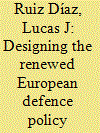

|
|
|
|
|
| Summary/Abstract |
As the COVID-19 crisis has evidenced, Europe is currently facing non-traditional, hybrid threats and challenges to its public order and security that question traditional, stand-alone responses. Conscious of this, during the last decade the European Union (EU) has developed several tools to deal with those security threats and challenges jointly by making full use of the Lisbon Treaty provisions. Indeed, in addition to the strengthening of the policies and instruments of the Area of Freedom, Security and Justice (AFSJ), the EU has particularly boosted European defence cooperation within the framework of the Common Foreign and Security Policy (CFSP) since 2016 through initiatives such as the Permanent Structured Cooperation (PeSCo). The aim of these defence initiatives is twofold: on the one hand, to complement AFSJ instruments to protect the EU homeland and its citizens; on the other, to enhance its response to international crises and contribute to international peace and security. A matter of future concern will be, nevertheless, to sustain the political momentum after the COVID-19 socioeconomic crisis and to show the positive externalities of enhancing defence cooperation in fighting non-traditional threats and challenges, notwithstanding the many difficulties that it will encounter in its uncertain path.
|
|
|
|
|
|
|
|
|
|
|
|
|
|
|
|
| 12 |
ID:
178613
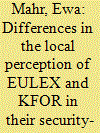

|
|
|
|
|
| Summary/Abstract |
This article compares the local perceptions of the EU Rule of Law Mission in Kosovo (EULEX) with those of NATO’s mission Kosovo Force (KFOR) and investigates the reasons for observed differences. It focuses on an oft-overlooked aspect of EULEX: its broadly defined security-related tasks. Until recently, EULEX could be seen as a prominent security actor, thanks to its robust police component and its function as a second respondent. EULEX coexists in Kosovo with KFOR; while the former is civilian and the latter military, both play complementary roles in the security realm and some of their tasks are similar. However, the local perceptions of EULEX and KFOR regarding their execution of security-related tasks have differed, with only KFOR enjoying local acceptance. This article argues that such differences are caused by the missions’ differently perceived powers over local actors, as manifested through their ability to exert compliance and cooperation from local actors through coercion, the ability to offer rewards and legitimacy. By going beyond the well-researched initial gratitude of Kosovo Albanians to NATO/US for intervening in 1999, this article offers a more fine-grained analysis of Kosovo Albanian and Kosovo Serbian perceptions of EULEX and KFOR.
|
|
|
|
|
|
|
|
|
|
|
|
|
|
|
|
| 13 |
ID:
160084
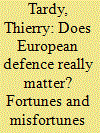

|
|
|
|
|
| Summary/Abstract |
This article examines how the defence component of the Common Security and Defence Policy (CSDP) has been revisited over the last few years. It argues that while the CSDP has grown predominantly as a security – rather than defence – policy, the latest developments that include the creation of a military headquarter, the launching of a Permanent Structured Cooperation (PESCO) and the new role for the European Commission in defence funding, attest to an evolution towards a more central EU defence policy. In the meantime, the article points to some structural impediments to the materialisation of European defence. The momentum says little about the form and finality of military operations that EU states will have to conduct so as to give a meaning to defence in a European context. Moreover, persisting divergences in the EU member states’ respective strategic cultures and institutional preferences – notably vis-à-vis NATO – are likely to continue to constrain European defence self-assertion.
|
|
|
|
|
|
|
|
|
|
|
|
|
|
|
|
| 14 |
ID:
148533
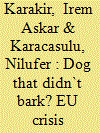

|
|
|
|
|
| Summary/Abstract |
Based on the commonly held assumptions about the inability of the European Union (EU) to cope with new challenges, this paper raises the question of whether the EU will assume greater responsibility for peace, especially in its neighborhood, in the short-term. It contributes to answering this question through focusing on EU mechanisms, instruments and policies of crisis management (civilian-military) since the 1990s, which is embodied in the European Security and Defense Policy (ESDP). In March 2015, the European External Action Service (EEAS) presented a report on CSDP indicating problems in crisis management. Yet, the EU strives for efficient activities. It considered reviewing its neighborhood policy as well as Common Security and Defence Policy (CSDP) to enable more effective actions to deal with crises. Today, it has a huge “toolbox” to address crises. The EU attaches great importance to a coherent and comprehensive strategy in crisis situations. Observing that a comprehensive strategy of the EU was launched in early 2015 to deal with the crisis in Syria, this paper questions to what extent the EU`s new arguments for crisis management are realized in its regional strategy for Syria. While the Syrian crisis is still unfolding, its impacts on the EU in the form of rising terror attacks in Europe by Islamic State in Iraq and Syria (ISIS), and an unprecedented influx of migrants are remarkable.
|
|
|
|
|
|
|
|
|
|
|
|
|
|
|
|
| 15 |
ID:
160085


|
|
|
|
|
| Summary/Abstract |
EU sanctions invoked in response to the Iranian nuclear crisis (2006–2016) were long considered to be of limited effectiveness in halting Iran’s nuclear ambitions. Recently, however, sanctions seem to have contributed to a breakthrough in the negotiations over Iran’s nuclear programme. This article aims at explaining this evolution. It, therefore, designs a framework that explains why sanctions (fail to) change targets’ behaviour. Since the sanctions effectiveness literature lacks an integrated framework to explain evolutions in effective coercion, this article merges sanctions effectiveness variables and Bretherton and Vogler’s actorness criteria. Applying the resulting framework to two broad episodes of the Iranian case (2006–2013 and 2013–2016), this article provides a first test of the framework’s added value. It concludes that a full understanding of sanctions effectiveness requires consideration of external, internal, and in-between factors.
|
|
|
|
|
|
|
|
|
|
|
|
|
|
|
|
| 16 |
ID:
154468
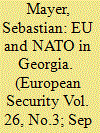

|
|
|
|
|
| Summary/Abstract |
Focusing on fragile Georgia since the early 2000s, the article takes a country-centred perspective on EU–NATO inter-organisationalism. It outlines the regional strategies of these core Western security institutions and assesses their complementarity and overlap across three sets of tasks: defence and empowerment, crisis management, and security sector reform. While there is hardly functional overlap in the first and second sets, in the third the EU and NATO intersect to a considerable degree. Also, there is no significant inter-organisational cooperation over Georgia. One key conclusion is that while field-level overlap clearly jeopardises institutional effectiveness, overlapping toolboxes – as in crisis management – allow for institutional flexibility when one international organisation setting offers reputational or practical advantages. Against this backdrop, a case can be made contra propositions of merging the Common Security and Defence Policy and NATO.
|
|
|
|
|
|
|
|
|
|
|
|
|
|
|
|
| 17 |
ID:
103198
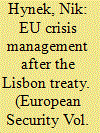

|
|
|
|
|
| Publication |
2011.
|
| Summary/Abstract |
The presented article focuses on key issues and developments in the European Union (EU)'s comprehensive crisis management planning, civil-military coordination and cooperation, as well as the future of the EU Operational Headquarters (OHQ). The article begins with a short overview of key changes in the EU's external action after the Lisbon Treaty, and focuses on the area of Common Foreign and Security Policy (CFSP) and Common Security and Defence Policy (CSDP). The impact of the European External Action Service on CSDP-CFSP cooperation in planning and on EU's crisis management is being examined. Further on, the article continues by addressing the issue area of EU crisis management. After the evolution of the concept and practice at the EU level is examined and different phases are discussed, the article analyses the main political, strategic and operational trends in this field. Indeed, this part reflects on the implications of the Lisbon Treaty for crisis management. What follows is an assessment of the civil-military coordination in the EU's crisis management structures. In order to contextualise the most recent transformations that are investigated at length, basic concepts and terms are outlined, and the evolution of civil-military coordination at the EU level is presented. The final substantive part tackles current and future EU OHQ options. After the necessary contextualisation, the characteristics and shortcomings of the three current options are analysed, and based on these limits, the case for the establishment of a permanent strategic planning and conduct structure in Brussels is put forward. Finally, concluding remarks and recommendations are attached.
|
|
|
|
|
|
|
|
|
|
|
|
|
|
|
|
| 18 |
ID:
173160
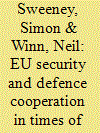

|
|
|
|
|
| Summary/Abstract |
Has the United Kingdom(UK) Brexit referendum been a catalyst for more European Union security cooperation? How significant are post-referendum initiatives in security and defence? What are the implications of Brexit for European Union (EU) and UK security and defence? This article analyses EU post-Brexit strategic choices following the launch of the EU Global Strategy (2016). EU autonomy in security and defence requires close cooperation with third countries, including Norway and post-Brexit UK. It remains to be seen whether the EU and the UK can forge a new bespoke security and defence relationship that delivers mutual benefits through shared strategic ambitions, while also protecting their various interests. We suggest there will be serious collateral damage to UK-EU security and defence cooperation if post-Brexit trade negotiations descend into acrimony and mistrust, especially in the event of “no-deal” once the “transition period” ends. This would undermine European security and the EU’s quest for strategic autonomy in world affairs and have serious implications for both UK and EU security. We conclude that the EU needs to work with the UK on a plan to achieve global strategic autonomy, or both risk reduced influence in the wider world in the years ahead.
|
|
|
|
|
|
|
|
|
|
|
|
|
|
|
|
| 19 |
ID:
154469
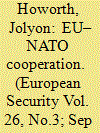

|
|
|
|
|
| Summary/Abstract |
The re-launch of the EU’s security and defence project in the wake of Brexit and the election of Donald Trump has focused the spotlight on the relationship between NATO and the EU. This article reviews the detailed aspects of that relationship as studied in the various contributions to this special issue. It argues that, over and above cooperation on the ground, the key issue to be addressed, which is usually skated over in the “big picture” literature on this question, is: where is all this heading? Is there a move towards a clear EU–NATO division of labour (if so, will it be geographic or functional?); or are the allies seeking a radical new balance of responsibilities and commitment as between the US and the Europeans for the stabilisation of the European neighbourhood? The paper argues that EU “strategic autonomy”, as called for in the Global Strategy document of 2016, can only be achieved through the Europeanisation of NATO itself.
|
|
|
|
|
|
|
|
|
|
|
|
|
|
|
|
| 20 |
ID:
134064
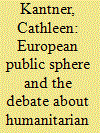

|
|
|
|
|
| Publication |
2014.
|
| Summary/Abstract |
Studies on the democratic control and legitimacy of Common Security and Defence Policy (CSDP) have thus far mostly focused on formal institutions. However, a comprehensive analysis requires including the 'sociocultural infrastructure' in which such formal institutions are embedded. Students of democracy have argued that the public sphere is a crucial dimension, if not a precondition for all mechanisms of democratic control in general. This paper investigates whether and in which ways Europeans participated in transnational European communication on humanitarian military interventions (1990-2005/2006). The paper analyzes a full sample of 108,677 newspaper articles published in leading newspapers of six EU member states, and the US as a comparative case. It demonstrates that the 'national' arenas of political communication are intertwined and allow ordinary citizens to make up their minds about common European issues in the highly controversial and normatively sensitive realm of humanitarian military interventions.
|
|
|
|
|
|
|
|
|
|
|
|
|
|
|
|
|
|
|
|
|